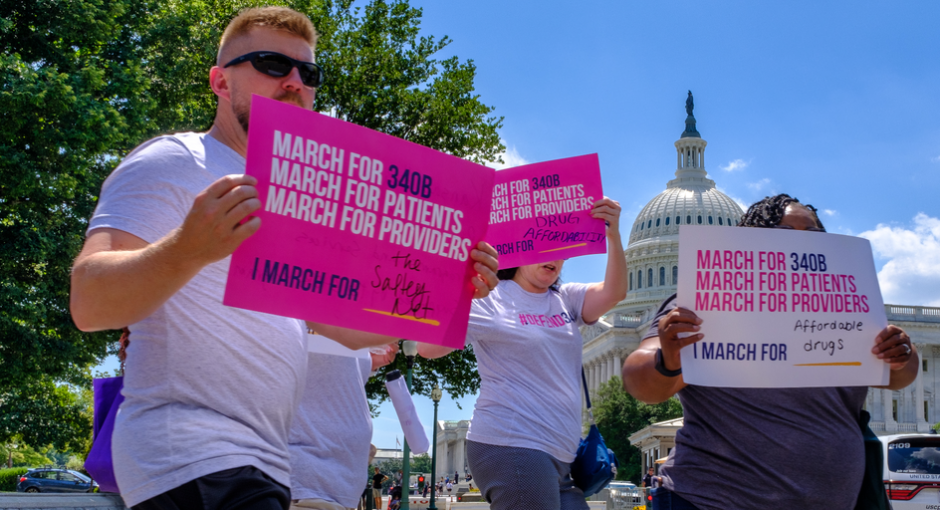About 100 safety-net provider advocates marched and chanted yesterday on the grounds of the U.S. Capitol to raise awareness in Congress and beyond about threats to the 340B drug pricing program.
The demonstration, organized by Community Voices for 340B (CV340B), was rare for the 340B provider community. It generally avoids participating in such actions. AIDS Healthcare Foundation is the main exception, and some AHF leaders participated in CV340B’s march. But most marchers were other 340B provider stakeholders.
The march began at about 1 p.m. after the 340B Coalition summer conference ended. CV340B posted multiple disclaimers on social media in the run-up to the march that it was unaffiliated with the coalition conference. The group also held a rally the night before the march near the conference venue across the Potomac River from Washington in Maryland.
“340B advocates get out from behind their desks and march down to Capitol Hill to defend 340B for their communities,” CV340B tweeted during the demonstration. “THIS is the way to win the fight to protect this vital safety net program.”
CV340B announced the march in June. At the time, a leader of the group said it was born out of a widespread feeling after this year’s 340B Coalition winter conference that more needed to be done to stop drug manufacturers’ 340B contract pharmacy restrictions and their harm to the safety net.
Brenda Reitz, Pharmacy Director at Family Health Services of Darke County in Greenville, Ohio, was one of the marchers. The federally qualified health center contracts with 53 chain and independent drug stores to dispense 340B purchased drugs. For Family Health, insulin is one of the main drugs affected by manufacturers’ restrictions on 340B pricing involving contract pharmacies.
“It’s jeopardizing patient care because we are having to switch patients to different insulins,” Reitz said. She said she decided to take part in the march “to make sure people are aware of what the 340B program is. It is coming under attack from manufacturers as well as insurers and PBMs.”
“We’re modest,” Reitz said. “I have never used my voice before to tell our story. I want the legislators to hear us but also patients. Nothing is going to change unless people are aware about what FQHCs do, that we serve you whether you can or cannot pay, and that without our services, healthcare is going to be destroyed. People are going to die because they are not going to be able to get the medications and services they need.”
Mark Malahosky, Vice President of Pharmacy Services at Trillium Health, a western New York FQHC look-alike and Ryan White clinic, said the 340B program lets Trillium offer wrap-around services to patients that it otherwise could not afford. “Food security, housing—none of that is funded if it wasn’t for the 340B program,” he said. Malahosky also serves on the Executive Committee of Ryan White Clinics for 340B Access (RWC-340B).
“Drug manufacturers, really against the statute, are limiting access to 340B through contract pharmacy,” Malahosky said. “Health centers have to limit the care they are providing because they aren’t getting the resources from 340B with these restrictions on contract pharmacy access.”
He said by marching he hoped “to draw attention to the fact that manufacturers are doing this, and it is harming patient care. It certainly is not in the spirit or intent of the 340B program. We’re here to make people aware and hopefully get some relief on this.”
“Hopefully, we can get some legislation passed or have hearing to get manufacturers to honor their commitment,” Malahosky said.
Laura Boudreau, Chief Operating Officer of AHF, said her group was participating in the march because 340B “is vital for the safety net and it’s under attack like never before.”
“It’s going to cost lives, it’s going to cost our ability to provide services, and it’s strangling the safety net. It’s just not OK, and we’re here to fight that,” Boudreau said.
“The savings that we get from the 340B program let us provide all sorts of services that would not be funded otherwise. For HIV for example, free testing, linkages to care, retention to care through our case management, when people fall out of care recovering them back in—there are so many things people living with a chronic condition like HIV need over time. It’s the 340B program that allows us to provide this whole array of wrap-around services to keep people engaged in care and healthy.”
She said by marching “we’re hoping to reach the public by being out here on the street, and lawmakers as well by being out in front of the Capitol, and saying to pharmaceutical companies and PBMs that we’re here to fight, we’re not going to let them reduce this program that is so vital to so many people.”
Representatives from the National Association of Community Health Centers, RWC-340B, and 340B covered entity consultants also participated in the march.


